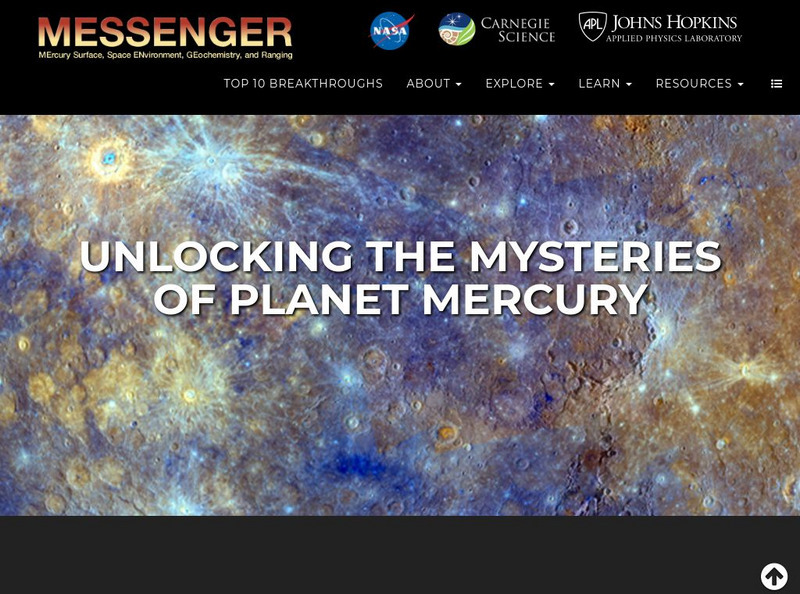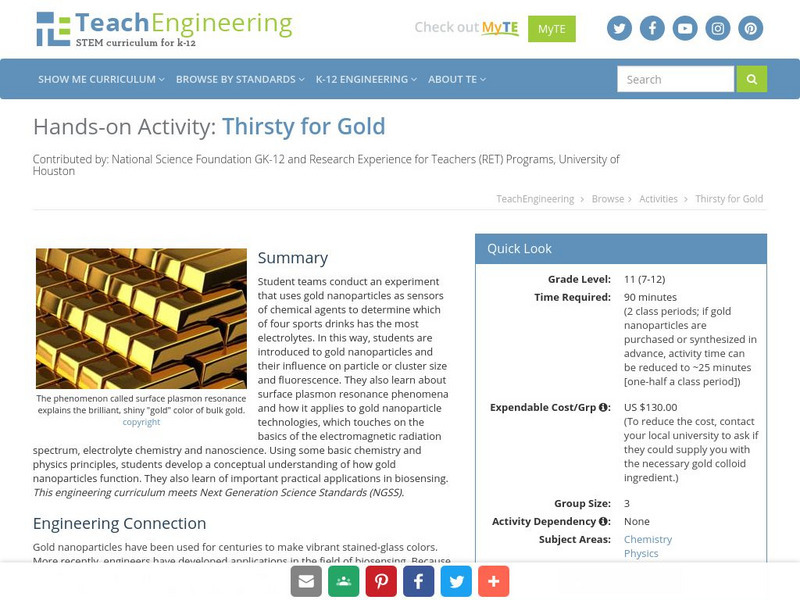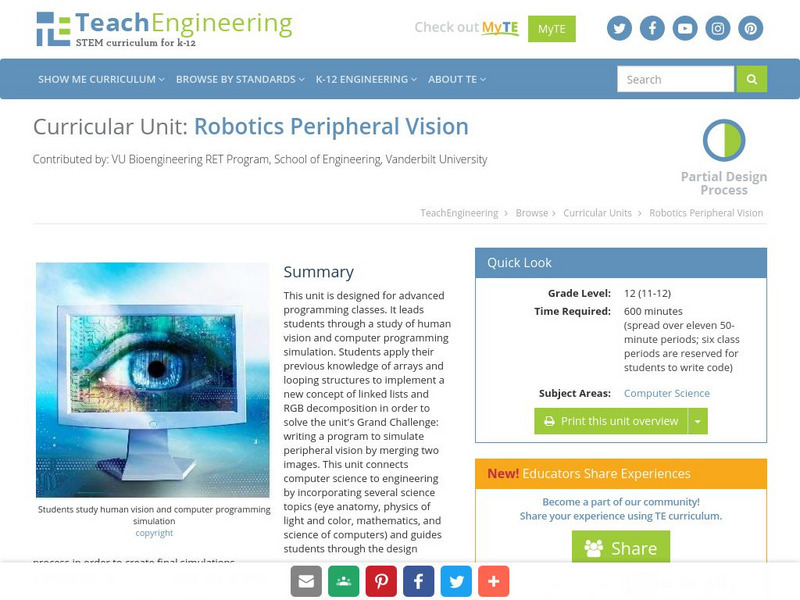Cosmo Learning
Cosmo Learning: Applied Science and Technology 210: Electrical Engineering
A collection of video lectures from a course that explores the application of electrical engineering topics. Webpage includes twenty-eight lectures from a professor at the University of California, Berkeley. Lectures vary in length and...
Georgia Department of Education
Ga Virtual Learning: Physical Science: Force and Motion
In this student-paced module, students apply Newton's Laws of Motion to everyday life, calculate mathematical relationships involving force and motion using algebraic formulas, and understand the difference between mass and weight.
Georgia Department of Education
Ga Virtual Learning: Ap Environmental Science: Course Introduction
An introduction to Environmental Science, an interdisciplinary field of study that integrates the biological and physical sciences in an effort to understand environmental systems, and the solutions to both man-made and natural...
NASA
Nasa: Rockets Educator Guide: Applying Newton's Laws
Learn how Newton's Laws apply to rocketry. Discover how rockets work, including the engines and propellants.
National Institute of Standards and Technology (NIST)
Nist: Physics Measurement Laboratory: Marie Curie and the Nbs Radium Standards
Use this site to learn about Marie Curie and her work with radioactivity which earned her worldwide recognition and two Nobel Prizes. This gallery is organized into a "timeline" of significant events, from 1913 to the present, in which...
American Association of Physics Teachers
Com Padre Digital Library: Open Source Physics: Schwarzschild Particle Energy
Apply the Schwarzschild metric to an object orbiting about a black hole. Manipulate the energy and angular momentum of the orbiting particle and observe the results.
American Association of Physics Teachers
Com Padre Digital Library: Open Source Physics: Schwarzschild Light Wavefront
Apply the Schwarzschild metric to the paths light travels when it radiates in every direction near a black hole. Adjust the position of the light source and observe the effective potential of the paths.
Johns Hopkins University
Applied Physics Laboratory: Messenger Home
Home page for NASA's Discovery Program Messenger to the planet Mercury. Site provides details of the planned mission, its experiments and the science and management teams. Linked Quicktime animation files are very large and detailed....
CK-12 Foundation
Ck 12: Physical Science: Newton's First Law
[Free Registration/Login may be required to access all resource tools.] Newton's first law of motion and how it applies in skateboarding.
Middle School Science
Middle School Science: Balloon Powered Race Cars
An idea developed by a physical science teacher who applied Newton's Laws of Motion in creating a balloon powered race car. Find simple objective, materials, rules, and procedures.
CK-12 Foundation
Ck 12: Physical Science: Newton's Third Law
[Free Registration/Login may be required to access all resource tools.] Newton's Third Law of Motion - action and reaction forces and why they are not balanced forces.
PBS
Pbs Learning Media: States of Matter Fitness Lesson Plan
In this lesson plan, students use their science knowledge and apply it using physical activity! Learning about the stages of matter, solid, liquid and gas, students perform an exercise for each as the teacher calls out an object such as...
TeachEngineering
Teach Engineering: Thirsty for Gold
Student teams conduct an experiment that uses gold nanoparticles as sensors of chemical agents to determine which of four sports drinks has the most electrolytes. In this way, students are introduced to gold nanoparticles and their...
University of Sydney (Australia)
Thermal Physics Module/temperature and Heat [Pdf]
A lengthy set of lecture notes on the distinction between heat and temperature. The science of thermography is introduced; the Kelvin temperature scale is explained and compared to the Celsius temperature scale. The meaning of a triple...
Read Works
Read Works: Sir Isaac Newton and Le Bron James
[Free Registration/Login Required] An informational text explaining how the laws of motion apply to basketball. A question sheet is available to help students build skills in reading comprehension.
ClassFlow
Class Flow: Electricity
[Free Registration/Login Required] Students can use this Flipchart to learn and apply Ohm's law to basic circuitry problems. Students are introduced to the relationship among voltage, current, and resistance, and then apply their newly...
Khan Academy
Khan Academy: Angular Momentum and Angular Impulse Review
Reference material that reviews how objects rotate and can have linear momentum and angular momentum. Also, learn how the angular momentum of an object can change when torque is applied to an object over time.
Khan Academy
Khan Academy: Gravitational Potential Energy at Large Distances Review
Review the equations and skills related to gravitational potential energy at large distances, including how to apply conservations laws to objects in orbit.
TeachEngineering
Teach Engineering: Robotics Peripheral Vision
This unit is designed for advanced programming classes. It leads students through a study of human vision and computer programming simulation. Students apply their previous knowledge of arrays and looping structures to implement a new...
TeachEngineering
Teach Engineering: Waves: The Three Color Mystery
Students are presented with a challenge question concerning color blindness and asked to use engineering principles to design devices to help people who are color blind. Using the legacy cycle as a model, this unit is comprised of five...
Curated OER
Educational Technology Clearinghouse: Clip Art Etc: Galileo Galilei
Galileo Galilei (15 February 1564 - 8 January 1642) was a Tuscan (Italian) physicist, mathematician, astronomer, and philosopher who played a major role in the scientific revolution. His achievements include improvements to the telescope...
Science Education Resource Center at Carleton College
Serc: Investigating Projectile Motion: Creating a Catapult
This lesson is for 9th grade physical science students. It begins with an inquiry-based lesson using a projectile motion computer simulation. It culminates with students building a catapult; applying and connecting science knowledge from...
Symmetry Magazine
Symmetry Magazine: Explain It in 60 Seconds: A Theory
The definition of a theory as it applied to science is explained in this brief article. "Explain It In 60 Seconds" is an article series that aims to summarize in a few paragraphs the meaning of different concepts in particle physics.



















